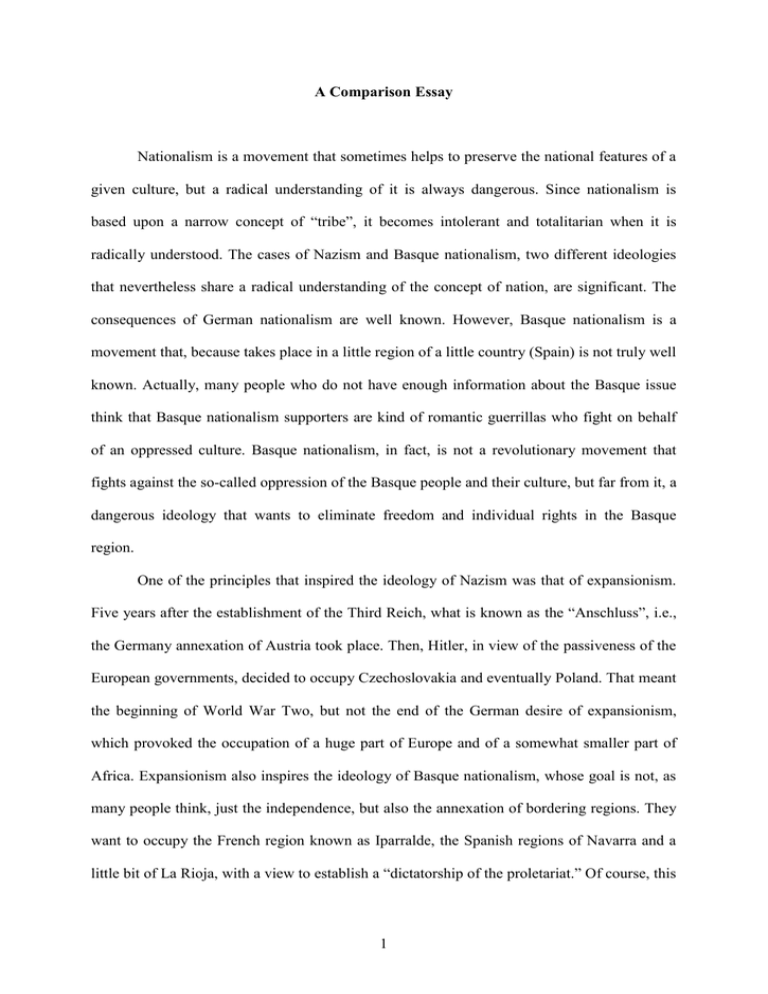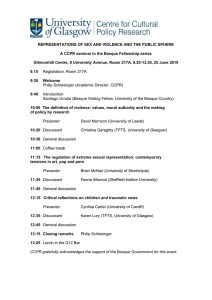Nationalism is a movement that sometimes helps to preserve the... given culture, but a radical ... A Comparison Essay
advertisement

A Comparison Essay Nationalism is a movement that sometimes helps to preserve the national features of a given culture, but a radical understanding of it is always dangerous. Since nationalism is based upon a narrow concept of “tribe”, it becomes intolerant and totalitarian when it is radically understood. The cases of Nazism and Basque nationalism, two different ideologies that nevertheless share a radical understanding of the concept of nation, are significant. The consequences of German nationalism are well known. However, Basque nationalism is a movement that, because takes place in a little region of a little country (Spain) is not truly well known. Actually, many people who do not have enough information about the Basque issue think that Basque nationalism supporters are kind of romantic guerrillas who fight on behalf of an oppressed culture. Basque nationalism, in fact, is not a revolutionary movement that fights against the so-called oppression of the Basque people and their culture, but far from it, a dangerous ideology that wants to eliminate freedom and individual rights in the Basque region. One of the principles that inspired the ideology of Nazism was that of expansionism. Five years after the establishment of the Third Reich, what is known as the “Anschluss”, i.e., the Germany annexation of Austria took place. Then, Hitler, in view of the passiveness of the European governments, decided to occupy Czechoslovakia and eventually Poland. That meant the beginning of World War Two, but not the end of the German desire of expansionism, which provoked the occupation of a huge part of Europe and of a somewhat smaller part of Africa. Expansionism also inspires the ideology of Basque nationalism, whose goal is not, as many people think, just the independence, but also the annexation of bordering regions. They want to occupy the French region known as Iparralde, the Spanish regions of Navarra and a little bit of La Rioja, with a view to establish a “dictatorship of the proletariat.” Of course, this 1 is just the beginning. Similar to the designs of Hitler, Basque nationalism demands today the annexation of a given territory with a view to claim a second one once the first request has been satisfied. Nazis considered that their right to belong to a nation prevailed over that of their neighbors, and so do Basque nationalism. In both cases, a radical understanding of the concept of “nation” leads to a desire for military expansionism, and that proves that nationalism, when radically understood, is a harmful movement that endangers peaceful living together. The Nazi ideology of expansionism was in part based upon the saying: “wherever German language is spoken, that is Germany” or “wherever there is a German, that is Germany.” Thus Nazis tried to justify the occupation of German-speaking countries, such as Austria, or the occupation of countries with a significant German population, such as Poland and Czechoslovakia. Basque nationalism supporters share this point of view. It is a wellknown fact that the Basque language had in the past a larger extension. They use this fact and come to the conclusion that every place where Basque language was spoken even only once during a short period of time, no matter how many languages were spoken at the same time in that given place, should be a part of the future Basque State. As it may be deduced from the examples above, the diehard grasp of “national language” that some radical nationalists promote easily derives to a highly damaging desire of supremacy. Racism is another cornerstone of both Nazism and Basque nationalism. Hitler adopted a theory according to which the German people descend from an old European tribe, the Arians, who were uncontaminated and pure from the point of view of their “race.” Basque nationalists also think that they, the pure Basque people, descend from a thousand-year-old tribe, that is racially different from the modern European people. Sabino Arana, the founder of Basque nationalism, in his book What are we?, which has the dubious honor of having anticipated the ideas later expressed by Hitler in Mein Kampf, wrote that no foreigner would 2 be able to become naturalized in the Basque Country. Concerning to the Spanish people, he used to think that the future Basque government would decide whether or not they should be expelled. He stated that, in the future, Basque citizenship would belong only to the original Basque families and, in general, only to the Basque-race families. “Basque people were not born to be in service, but to be lords,” he wrote, whereas, on the other hand, Spanish people were only born to be vassals and serves. He was unable to understand why Spanish people were afraid of hearing that immigrants should be expelled from Basque cities with stones. These ideas have not been rejected by the current Basque radicals. Far from it, they have gone even further. The current president of the Basque Nationalist Party, Xavier Arzallus, claims that the Basque people share a blood type (Rh negative) that is completely different from that of the rest of mankind. “The issue of Rh-negative blood”, he said once, “proves that ours is an old tribe that has its own roots.” The most remarkable thing is that these are not just abstract ideas. They do have consequences in the daily life of Basque people. For instance, there are two soccer teams in the Basque Country that select their players according to the criteria of racial purity. One of them, called Athletic de Bilbao, selects only racially pure Basque players. The second one, called Real Sociedad de San Sebastian, only forbids hiring Spanish players. As these facts show, an extremist understanding of nationalism and of the concepts of “tribe” and “race” that it implies invariably guides to intolerance and racism. Scholars agree that one of the most important methods that Nazism employed to achieve power, and after that, to be perpetuated in it, was that of annihilating the opposition. Nazis eventually succeeded in their policy of ethnic cleansing. However, although Basque nationalism has obtained some results, they are still far from reaching their goal. A photograph of the Basque Parliament is meaningful. It shows the typical appearance of a parliament in a fascist regime, where all the deputies who represent opposition parties have to be always accompanied by a body guard, because they all are at risk of being killed. Both 3 Nazism and Basque nationalism have employed a wide variety of methods with a view to the annihilation of the opposition. The simplest one is assassination, and, as a matter or fact, Basque nationalists have killed more than a thousand people in the last thirty years. They have established a kingdom of terror similar to that of the thirties in Germany. People cannot express their political opinions freely, because those who do not share the nationalist dogma are in danger of being assassinated. A significant example of this occurred during the last elections in the Basque country. The Peoples Party, one of the Spanish parties that tries to fight against Basque nationalism, decided to celebrate a meeting in a little Basque town. Nobody attended the meeting. However, when the day of the elections came, the Peoples Party got an absolute majority. It is a good example of how the Basque dictatorship of fear works. Basque nationalism supporters, like Nazis, are a minority, but have become the rulers of many cities and towns by means of threat. They threaten the alternative candidates, so that they finally give their political career up and, eventually, they are the only party to present candidates. This policy of intimidation has provoked thousands and thousands of Basques to go into exile. Nazism led, and Basque nationalism certainly does, to a society where dissidence becomes impossible and where the one faction’s thought is established. So does any fanatic conception of nationalism, which customarily tries to annihilate any cultural and ideological alternative or difference. Nazism and Basque nationalism are obviously diverse ideologies. Nonetheless, they have eventually coincided, because the harmful spirit of extremist nationalism inspires them both. As it may be deduced from the paragraphs above, nationalism is a dangerous ideology that, when radically understood, causes lack of freedom and individual rights in the regions where it rules. 4




